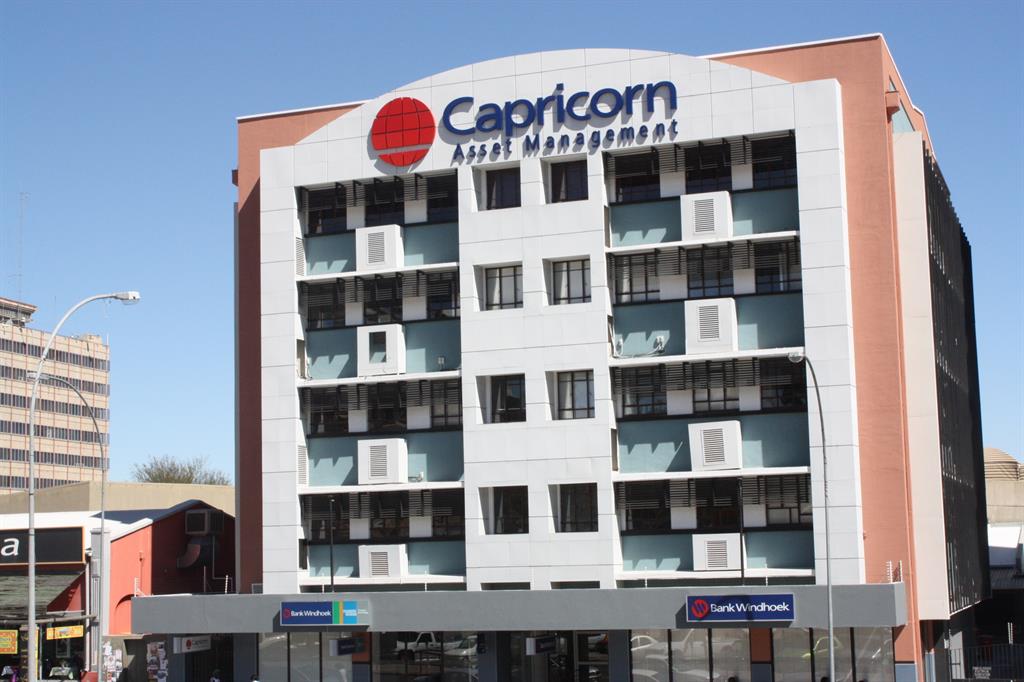Capricorn’s loss-making Cavmont to merge
The Zambian banking sector is highly competitive which makes it difficult for a small player in the market like Cavmont Bank to achieve scale, Capricorn Group says.
Jo-Maré Duddy – Locally-listed Capricorn Group’s Cavmont Bank intends merging with Access Bank Zambia to become one of the top ten banks in Zambia.
In a voluntary announcement Thursday on the Namibian Stock Exchange (NSX), Capricorn said Cavmont Capital Holdings Zambia PLC (CCHZ) has signed a share purchase agreement with Access Bank (Zambia) Limited, a subsidiary of Access Bank Plc, regarding a proposed merger of Access Bank (Zambia) Limited (Access Bank Zambia) and Cavmont Bank Limited (Cavmont Bank).
Capricorn owns 98.03% of CCHZ, which owns 100% of the share capital of Cavmont Bank.
Under the terms of the agreement, Access Bank Zambia will acquire the entire issued ordinary share capital, assets and liabilities of Cavmont Bank while Capricorn will reinvest at least 300 million Zambian kwacha or about N$291 million of preference shares into the combined bank.
Capricorn will hold preference shares in the enlarged Access Zambia for a period of five years, after which the preference shares will be acquired by Access Bank Plc for a maximum purchase amount of 300 million kwacha.
The transaction is expected to close during the fourth quarter of 2020, subject to the meeting of various conditions which, among others, include CCHZ shareholder approval, relevant regulatory approvals and the local and regional competition commission authorities.
One or more of Cavmont Bank’s existing directors will remain on the board of the merged entity following the completion of the transaction.
Once implemented, the combined bank is expected to boast a strong capital base in excess of 600 million kwacha, significantly exceeding the capital requirement for foreign-owned banks under the regulations of the Bank of Zambia, Cavmont Bank and Access said in a combined statement.
“This robust capital structure will not only ensure the banks’ customer deposit base benefits from the greater security, but will also form the foundation for sustainable banking operations and future growth,” it said.
‘Excellent strategic fit’
“Access Bank Plc is an African banking group with an impressive growth trajectory and geographic reach across Africa and internationally. It is an excellent strategic fit with Cavmont Bank’s presence in Zambia and will strengthen the capital base from which to achieve long-term sustainable growth,” said the Group CEO of Capricorn, Thinus Prinsloo.
He continued: “Zambia is an African economy with significant economic potential that is poised for a robust recovery, and this combination best positions the combined bank to capture these opportunities.”
In Capricorn’s 2019 Annual Integrated Report, group chairman Johan Swanepoel said significant changes were made to its business model in Zambia, “away from an elaborate network of small and unsustainable rural branches to serving more established small and medium-sized enterprises (SMEs)”.
“Without minimum scale for Cavmont Bank in any segment, we had to make difficult decisions to ensure a turnaround towards profitability. These interventions take time and require extensive interaction with regulators but are starting to deliver improvements,” Swanepoel said.
The performance of Capricorn’s Zambian interest is included in “other” in the segmental analysis in the group financials – together with property development, unit trust management and asset management. These components each contribute less than 10% to the group revenue, assets and net profit after tax.
In the latest set of financial results, “others” suffered a loss after tax of N$15.4 million for the six months ended 31 Decemeber 2019 compared to a loss of N$15.9 in the same half-year in 2018.
Exit strategy?
Cavmont Bank was recaptilised in 2007 and again in 2013, while in 2019 it was restructured and rationalised.
Asked whether Capricorn’s restructing excertise was unsuccessful, the Group responded: “Not at all. This was the right deal at the right time. The operational improvements we were delivering as part of the turnaround strategy generated interest from buyers.”
The Zambian banking sector, however, is highly competitive which makes it difficult for a small player in the market like Cavmont Bank to achieve scale.
According to Capricorn, Cavmont Bank had a big network of small and unsustainable branches which was restructured and rationalised in 2019 as part of a process to review overall operational costs and efficiencies.
Other challenges the bank faced, was that it did not have the minimum scale in any segment with a focus on mainly the retail sector. It had to cope with high cost of funding and liquidity constraints which impacted on the bank’s ability to provide loans and credit to corporate customers.
Growth in the balance sheet also consumed capital and there was a recapitalisation in 2013 when the new capital requirements came into effect for foreign owned banks, Capricorn said.
In addition, several other regulations and the economy resulted in further capital injections through preference shares and utilisation of capital when IFRS9 came in.
Asked whether the new deal is Capricorn’s way to exit the Zambian market due to the economic environment, the group said: “The current economic environment does not justify new capital investments in the banking sector. A merger of two smaller banks create the most viable opportunity to be sustainable for all stakeholders in Zambia.”
“Although it was not the strategic intent to exit Zambia, only one party can take the lead as shareholder of reference and with Access Bank being the larger group, this was the best option,” Capricorn said.
Key highlights
The key highlights of the proposed transaction includes a complimentary transaction that combines Access Bank Zambia’s wholesale and trade finance capabilities with Cavmont Bank’s retail and commercial banking operations.
Access Bank Zambia and Cavmont Bank customers will benefit from greater security offered by one of the most capitalised banks in the country, a more spohisticated product and service offering and a broader geographical network.
In a voluntary announcement Thursday on the Namibian Stock Exchange (NSX), Capricorn said Cavmont Capital Holdings Zambia PLC (CCHZ) has signed a share purchase agreement with Access Bank (Zambia) Limited, a subsidiary of Access Bank Plc, regarding a proposed merger of Access Bank (Zambia) Limited (Access Bank Zambia) and Cavmont Bank Limited (Cavmont Bank).
Capricorn owns 98.03% of CCHZ, which owns 100% of the share capital of Cavmont Bank.
Under the terms of the agreement, Access Bank Zambia will acquire the entire issued ordinary share capital, assets and liabilities of Cavmont Bank while Capricorn will reinvest at least 300 million Zambian kwacha or about N$291 million of preference shares into the combined bank.
Capricorn will hold preference shares in the enlarged Access Zambia for a period of five years, after which the preference shares will be acquired by Access Bank Plc for a maximum purchase amount of 300 million kwacha.
The transaction is expected to close during the fourth quarter of 2020, subject to the meeting of various conditions which, among others, include CCHZ shareholder approval, relevant regulatory approvals and the local and regional competition commission authorities.
One or more of Cavmont Bank’s existing directors will remain on the board of the merged entity following the completion of the transaction.
Once implemented, the combined bank is expected to boast a strong capital base in excess of 600 million kwacha, significantly exceeding the capital requirement for foreign-owned banks under the regulations of the Bank of Zambia, Cavmont Bank and Access said in a combined statement.
“This robust capital structure will not only ensure the banks’ customer deposit base benefits from the greater security, but will also form the foundation for sustainable banking operations and future growth,” it said.
‘Excellent strategic fit’
“Access Bank Plc is an African banking group with an impressive growth trajectory and geographic reach across Africa and internationally. It is an excellent strategic fit with Cavmont Bank’s presence in Zambia and will strengthen the capital base from which to achieve long-term sustainable growth,” said the Group CEO of Capricorn, Thinus Prinsloo.
He continued: “Zambia is an African economy with significant economic potential that is poised for a robust recovery, and this combination best positions the combined bank to capture these opportunities.”
In Capricorn’s 2019 Annual Integrated Report, group chairman Johan Swanepoel said significant changes were made to its business model in Zambia, “away from an elaborate network of small and unsustainable rural branches to serving more established small and medium-sized enterprises (SMEs)”.
“Without minimum scale for Cavmont Bank in any segment, we had to make difficult decisions to ensure a turnaround towards profitability. These interventions take time and require extensive interaction with regulators but are starting to deliver improvements,” Swanepoel said.
The performance of Capricorn’s Zambian interest is included in “other” in the segmental analysis in the group financials – together with property development, unit trust management and asset management. These components each contribute less than 10% to the group revenue, assets and net profit after tax.
In the latest set of financial results, “others” suffered a loss after tax of N$15.4 million for the six months ended 31 Decemeber 2019 compared to a loss of N$15.9 in the same half-year in 2018.
Exit strategy?
Cavmont Bank was recaptilised in 2007 and again in 2013, while in 2019 it was restructured and rationalised.
Asked whether Capricorn’s restructing excertise was unsuccessful, the Group responded: “Not at all. This was the right deal at the right time. The operational improvements we were delivering as part of the turnaround strategy generated interest from buyers.”
The Zambian banking sector, however, is highly competitive which makes it difficult for a small player in the market like Cavmont Bank to achieve scale.
According to Capricorn, Cavmont Bank had a big network of small and unsustainable branches which was restructured and rationalised in 2019 as part of a process to review overall operational costs and efficiencies.
Other challenges the bank faced, was that it did not have the minimum scale in any segment with a focus on mainly the retail sector. It had to cope with high cost of funding and liquidity constraints which impacted on the bank’s ability to provide loans and credit to corporate customers.
Growth in the balance sheet also consumed capital and there was a recapitalisation in 2013 when the new capital requirements came into effect for foreign owned banks, Capricorn said.
In addition, several other regulations and the economy resulted in further capital injections through preference shares and utilisation of capital when IFRS9 came in.
Asked whether the new deal is Capricorn’s way to exit the Zambian market due to the economic environment, the group said: “The current economic environment does not justify new capital investments in the banking sector. A merger of two smaller banks create the most viable opportunity to be sustainable for all stakeholders in Zambia.”
“Although it was not the strategic intent to exit Zambia, only one party can take the lead as shareholder of reference and with Access Bank being the larger group, this was the best option,” Capricorn said.
Key highlights
The key highlights of the proposed transaction includes a complimentary transaction that combines Access Bank Zambia’s wholesale and trade finance capabilities with Cavmont Bank’s retail and commercial banking operations.
Access Bank Zambia and Cavmont Bank customers will benefit from greater security offered by one of the most capitalised banks in the country, a more spohisticated product and service offering and a broader geographical network.





Kommentaar
Republikein
Geen kommentaar is op hierdie artikel gelaat nie